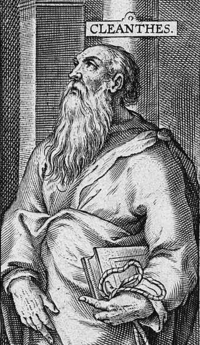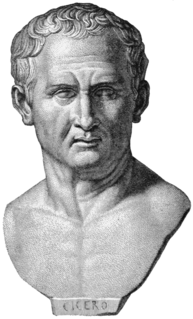
Zeno of Citium was a Hellenistic philosopher from Citium, Cyprus. Zeno was the founder of the Stoic school of philosophy, which he taught in Athens from about 300 BC. Based on the moral ideas of the Cynics, Stoicism laid great emphasis on goodness and peace of mind gained from living a life of virtue in accordance with nature. It proved very popular, and flourished as one of the major schools of philosophy from the Hellenistic period through to the Roman era, and enjoyed revivals in the Renaissance as Neostoicism and in the current era as Modern Stoicism.

Chrysippus of Soli was a Greek Stoic philosopher. He was a native of Soli, Cilicia, but moved to Athens as a young man, where he became a pupil of Cleanthes in the Stoic school. When Cleanthes died, around 230 BC, Chrysippus became the third head of the school. A prolific writer, Chrysippus expanded the fundamental doctrines of Zeno of Citium, the founder of the school, which earned him the title of Second Founder of Stoicism.

Cleanthes, of Assos, was a Greek Stoic philosopher and boxer who was the successor to Zeno of Citium as the second head (scholarch) of the Stoic school in Athens. Originally a boxer, he came to Athens where he took up philosophy, listening to Zeno's lectures. He supported himself by working as a water-carrier at night. After the death of Zeno, c. 262 BC, he became the head of the school, a post he held for the next 32 years. Cleanthes successfully preserved and developed Zeno's doctrines. He originated new ideas in Stoic physics, and developed Stoicism in accordance with the principles of materialism and pantheism. Among the fragments of Cleanthes' writings which have come down to us, the largest is a Hymn to Zeus. His pupil was Chrysippus who became one of the most important Stoic thinkers.

The gens Lucilia was a plebeian family at ancient Rome. The most famous member of this gens was the poet Gaius Lucilius, who flourished during the latter part of the second century BC. Although many Lucilii appear in Roman history, the only one known to have obtained any of the higher offices of the Roman state was Lucilius Longus, consul suffectus in AD 7.

Panaetius of Rhodes was an ancient Greek Stoic philosopher. He was a pupil of Diogenes of Babylon and Antipater of Tarsus in Athens, before moving to Rome where he did much to introduce Stoic doctrines to the city, thanks to the patronage of Scipio Aemilianus. After the death of Scipio in 129 BC, he returned to the Stoic school in Athens, and was its last undisputed scholarch. With Panaetius, Stoicism became much more eclectic. His most famous work was his On Duties, the principal source used by Cicero in his own work of the same name.
Zeno of Sidon was a Greek Epicurean philosopher from the Seleucid city of Sidon. His writings have not survived, but there are some epitomes of his lectures preserved among the writings of his pupil Philodemus.
Aristo of Chios also spelled Ariston was a Greek Stoic philosopher and colleague of Zeno of Citium. He outlined a system of Stoic philosophy that was, in many ways, closer to earlier Cynic philosophy. He rejected the logical and physical sides of philosophy endorsed by Zeno and emphasized ethics. Although agreeing with Zeno that Virtue was the supreme good, he rejected the idea that morally indifferent things such as health and wealth could be ranked according to whether they are naturally preferred. An important philosopher in his day, his views were eventually marginalized by Zeno's successors.
Clitomachus or Cleitomachus was a Greek philosopher, originally from Carthage, who came to Athens in 163/2 BC and studied philosophy under Carneades. He became head of the Academy around 127/6 BC. He was an Academic skeptic like his master. Nothing survives of his writings, which were dedicated to making known the views of Carneades, but Cicero made use of them for some of his works.

De Divinatione is a philosophical dialogue about ancient Roman divination written in 44 BC by Marcus Tullius Cicero.
Diogenes of Babylon was a Stoic philosopher. He was the head of the Stoic school in Athens, and he was one of three philosophers sent to Rome in 155 BC. He wrote many works, but none of his writings survived, except as quotations by later writers.

Leontion was a Greek Epicurean philosopher.

De Natura Deorum is a philosophical dialogue by Roman Academic Skeptic philosopher Cicero written in 45 BC. It is laid out in three books that discuss the theological views of the Hellenistic philosophies of Epicureanism, Stoicism, and Academic Skepticism.
Balbus is Latin for "stammerer", and may refer to:
Katalepsis in Stoic philosophy, meant comprehension. To the Stoic philosophers, katalepsis was an important premise regarding one's state of mind as it relates to grasping fundamental philosophical concepts, and it represents the Stoic solution to the problem of the criterion.
Diodotus was a Stoic philosopher, and was a friend of Cicero.
This page is a list of topics in ancient philosophy.
Phaedrus was an Epicurean philosopher. He was the head (scholarch) of the Epicurean school in Athens after the death of Zeno of Sidon around 75 BC, until his own death in 70 or 69 BC. He was a contemporary of Cicero, who became acquainted with him in his youth at Rome. During his residence in Athens Cicero renewed his acquaintance with him. Phaedrus was at that time an old man, and was already a leading figure of the Epicurean school. He was also on terms of friendship with Velleius, whom Cicero introduces as the defender of the Epicurean tenets in the De Natura Deorum, and especially with Atticus. Cicero especially praises his agreeable manners. He had a son named Lysiadas. Phaedrus was succeeded by Patro.

Ipse dixit is an assertion without proof, or a dogmatic expression of opinion.
De Fato is a partially lost philosophical treatise written by the Roman orator Cicero in 44 BC. Only two-thirds of the work exists; the beginning and ending are missing. It takes the form of a dialogue, although it reads more like an exposition, whose interlocutors are Cicero and his friend Aulus Hirtius.
The gens Laelia was a plebeian family at Rome. The first of the gens to obtain the consulship was Gaius Laelius in 190 BC.
![]() This article incorporates text from a publication now in the public domain : Smith, William, ed. (1870). "Balbus, Q. Lucilius". Dictionary of Greek and Roman Biography and Mythology . p. 457.
This article incorporates text from a publication now in the public domain : Smith, William, ed. (1870). "Balbus, Q. Lucilius". Dictionary of Greek and Roman Biography and Mythology . p. 457.







